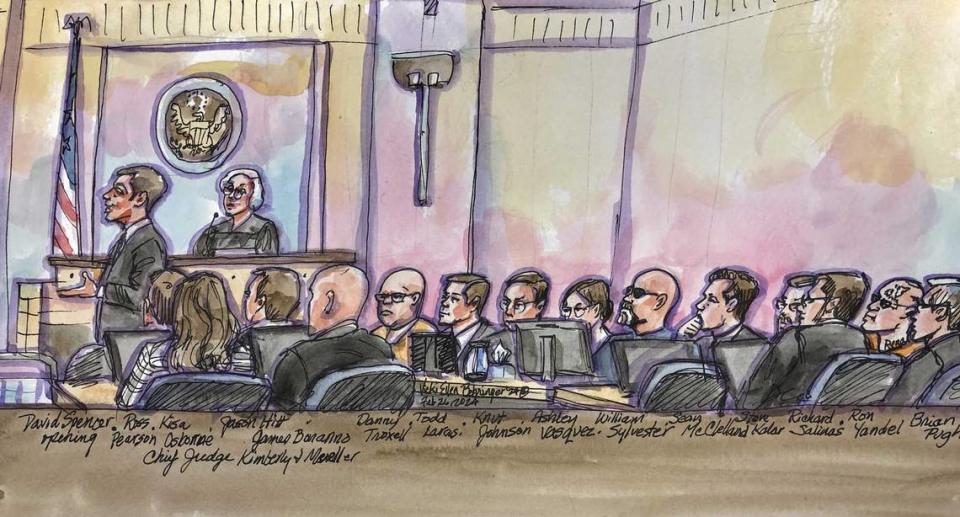After 5 years of legal wrangling, Aryan Brotherhood trial begins in Sacramento federal court
Nearly five years after prosecutors announced they had charged leaders of California’s Aryan Brotherhood prison gang with racketeering, murder and drug peddling, the trial began in a Sacramento federal courtroom Monday with video of a bloody inmate slaying and descriptions of the gang as focused on gaining money and power.
“The violence, the murders, is what gave these defendants power as Aryan Brotherhood members,” Assistant U.S. Attorney David Spencer told jurors in opening statements of what is expected to be a two-month trial.
Three inmate defendants are on trial — Ronald Yandell, Daniel Troxell and William Sylvester — in a case that prosecutors have said showed the power and reach of a gang that was able to order hits on inmates inside California prisons as well as targets outside of prison.
Prosecutors say Yandell and Troxell are two of the three-man “commission” that ruled the Aryan Brotherhood and had the power to authorize the killing of fellow AB members if they broke gang rules.

“You’ll hear that every Aryan Brotherhood member is expected to be a killer,” Spencer told jurors before Chief U.S. District Judge Kimberly J. Mueller, who is presiding over the trial in the federal courthouse in downtown Sacramento amid tight security.
“The Aryan Brotherhood doesn’t order non-fatal assaults,” Spencer said. “Every Aryan Brotherhood murder sends a terrifying message.”
As evidence, prosecutors played video from an Oct. 7, 2011, attack at California State Prison, Sacramento, in which inmate Ronald Richardson was stabbed 31 times in a prison yard by Sylvester and fellow inmate Lance Clemens.
Sylvester and Clemens were convicted of murder in Sacramento Superior Court in 2018 and sentenced to life, but the federal government’s racketeering case has brought the case back to light as prosecutors try to show that Yandell, Troxell and Sylvester are guilty of racketeering and other crimes involving the gang.
Spencer described the attack on Richardson as one that was in the making for years as payback for Skinhead gang members trying to challenge the authority of the Aryan Brotherhood.
“Sylvester was so proud of this murder that he bragged about it years later,” Spencer said, adding that Spencer committed the slaying to gain membership in the gang.
But defense attorneys for the men signaled to jurors that the California prison system may end up on trial, and court filings in the case have described allegations of prison guards conspiring to kill inmates and plant evidence. Other filings have described plots among inmates to assault or kill each other.
Yandell attorney Sean McClelland argued that prosecutors plan to utilize unreliable witnesses who have won cushy plea deals and “have a huge amount to gain by lying to you.”
“In California prisons, chaos reigns,” McClelland said, adding that the prisons are filled with corruption, drugs, phones and other contraband.
Sylvester attorney Knut Johnson wasted no time getting to the heart of the matter about his client, telling jurors in his opening statement that “Mr. Sylvester killed Mr. Richardson” and that there was no question about it.
But, he said, Richardson was killed because he was known as a child molester, that “it had nothing to do with the Aryan Brotherhood” and that he should be acquitted of the charges he faces.
Prosecutors emphasized that Sylvester was involved in the Richardson murder, calling as their first two witnesses guards at CSP-Sacramento, better known as New Folsom, who were present the day Richardson was stabbed to death.
They also played a grainy black-and-white video of the stabbing taken by a prison camera as Sylvester sat at the defense table watching.
Retired prison guard David Villasenor testified that he was in an observation tower the day of the slaying when he heard “what sounded like someone punching a punching bag” and grunting randomly.
He looked toward the sound and saw two inmates hovering over another inmate who was face down on the ground.
Villasenor said he later recognized Sylvester as one of the two, and under questioning from Johnson, Sylvester’s lawyer, he said he had testified in the state trial in which Sylvester was convicted.
In that trial and in his reports on the incident, Villasenor said that he never mentioned the Aryan Brotherhood.
Troxell attorney Todd Leras pursued another defense, telling jurors that his client was one of the older AB members and had been kept in isolation in California prisons for nearly three decades.
He argued that Troxell was instrumental in getting the California Department of Corrections and Rehabilitation to settle a lawsuit Troxell and inmate Todd Ashker filed over the use of isolation against inmates at Pelican Bay State Prison, and said that his client had worked to protect some inmates from assault.
Troxell faces charges of racketeering and conspiracy to commit murder, and Leras argued that prosecutors have misconstrued comments intercepted on a wiretap made in a phone call between Yandell and Troxell in 2016 as evidence that Troxell was pushing for the murder of an inmate at Calipatria State Prison near the Salton Sea.
“I’m not saying he’s a saint,” Leras said, but added that Troxell’s efforts to protect some inmates had led to him being targeted for murder by other AB members.
Prosecutors announced last year that they did not plan to pursue the death penalty at trial, and the case has dwindled since the first criminal complaint filed in 2019 named 16 defendants.
Since then, one has killed himself and others have taken plea deals.

